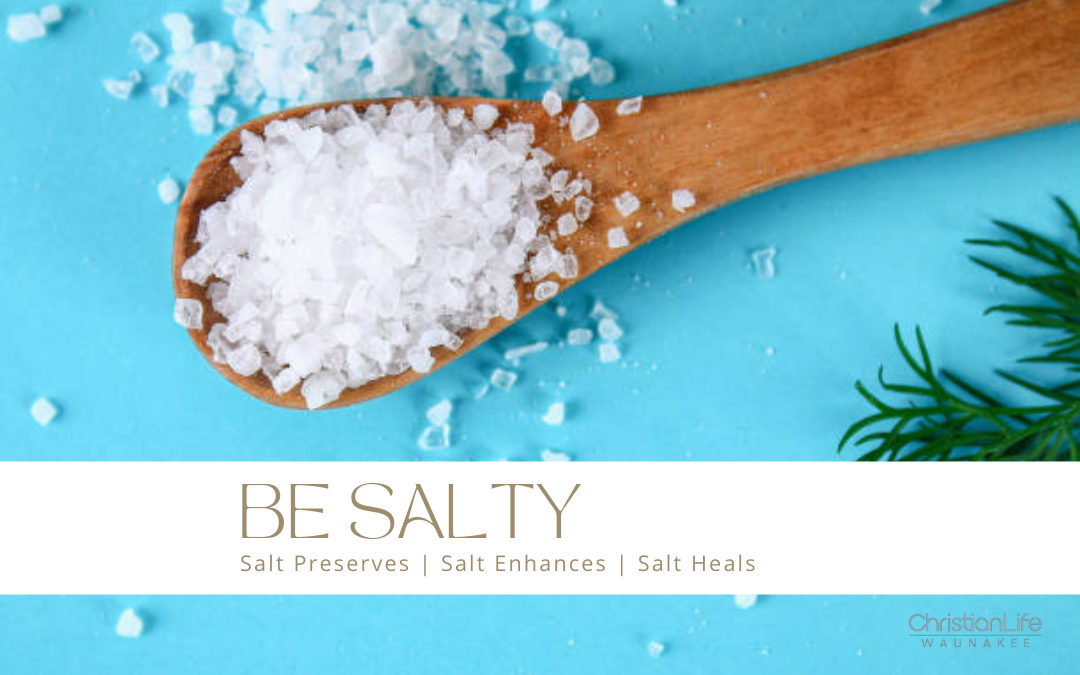The word salty has an interesting history involving the sea, sailors, ‘colorful’ language, and angry outbursts. Beyond just referring to the taste of salt, salty has come to mean angry, resentful, or bitter. These days, if someone is being salty, they’re usually lashing out about something trivial or miffed about something that embarrassed them. It’s a fun adjective for an unfun emotion, but the Christian is called to be salty in a different way.
In the Sermon on the Mount in Matthew 5, Jesus says, “You are the salt of the earth. But if the salt loses its saltiness, how can it be made salty again? It is no longer good for anything, except to be thrown out and trampled underfoot” (Matthew 5:13). Back in the first century, salty obviously didn’t have the same connotation it has today, so what did Jesus mean when He told His followers that they were the salt of the earth? How can we be salty? Jesus didn’t explain explicitly what He meant as part of the sermon, but we can look at the context of the verse and what we know about salt to get a good idea of what’s expected of us as believers.
The verse directly follows the beatitudes. What we call the Beatitudes are nine statements that Jesus uses to open His sermon, all starting with “Blessed are___” (Matthew 5:3-12). The ones whom Jesus calls blessed include “the poor in spirit” (v. 3), “those who mourn” (v. 4), “the meek” (v. 5), “those who hunger and thirst for righteousness” (v. 6), “the merciful” (v. 7), “the pure in heart” (v. 8), “the peacemakers” (v. 9), and “those who are persecuted because of righteousness” (v. 10). These are the people Jesus calls the salt of the earth.
Salt is a preservative. Salt has been used to preserve food for ages. It keeps food from spoiling by drawing out moisture and preventing bacteria from growing. Many think that part of being the salt of the earth means that followers of Jesus preserve the goodness in the world, having a positive effect everywhere they are.
Salt makes things taste good. Even more obvious than salt’s preservative qualities is that it’s a delicious seasoning. The other day I was making soup that “just didn’t taste quite right.” My mom tasted it and immediately said, “Needs more salt.” It turns out quite a lot of bland dishes can be rescued with the addition of plain old salt. Similarly, those who follow Jesus and live by His commandments enrich the world and demonstrate redemption within it. Sprinkled throughout the world, we enhance its flavor like salt enhances food. Our unique behavior and character should invite people to “taste and see that the Lord is good” (Psalm 34:8).
Salt can be healing. In addition to flavor and preservation, salt seems to have some antibacterial and antiseptic properties that can be used to aid healing. This is why people often use warm salt water rinses to treat sore throat or wounds in the mouth. Jesus may also have had this medicinal use in mind when He delivered His sermon. Although only Jesus can accomplish salvation, as His followers we can participate in healing the world from the effects of the Fall and holding back its corruption until it’s finally made new.
How can we be salty? In calling His followers salt, Jesus gives us a role in His great story. We have the work of standing out and showing people a taste of what it’s like to know Jesus. There are many ways to interpret and apply the salt of the earth metaphor, but here are a few that stand out to me now:
- We should preserve the truth and preserve what’s right so that people can easily find it.
- Our “flavor” should pleasantly season life and make people want to know more, not push them away.
- We can participate in the healing of the world from sin and its effects, most importantly by leading people to the Great Physician.
—————————————————

